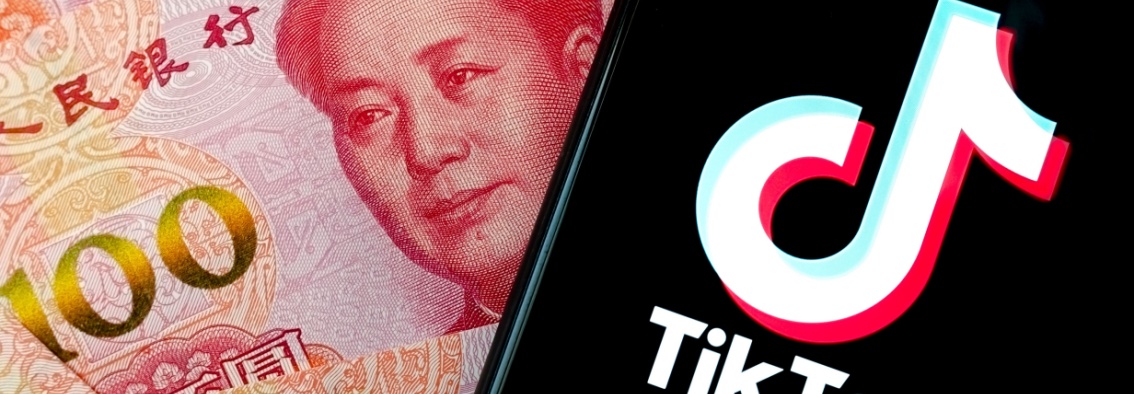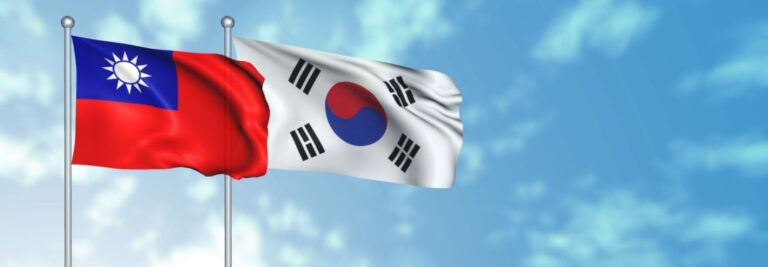Individuals who behave insincerely—like influencers who tailor their views to chase clicks, or politicians who stage good deeds for public approval—do not just waste people’s time, attention, and emotional energy. They also exploit trust and goodwill for their own gain. This kind of inauthenticity was often dismissed as a personal quirk, not a serious threat. But in Taiwan today, there are now instances where such behaviors that once appeared tolerable—perhaps amusing, odd, or irrelevant—have triggered explicit governmental intervention and social condemnation.
Commonly labeled as xiaofenhong (小粉紅, “little pinks”) by netizens, a small number of influencers on the platform Douyin (抖音), mostly immigrants from the People’s Republic of China (PRC) to Taiwan, have recently gained notoriety for openly advocating for Taiwan’s unification with China—sometimes even supporting a military invasion. Their provocative public displays have included waving the PRC flag and livestreaming pro-unification messages from prominent locations in Taipei.
Their behavior has cast a spotlight on the uneasy question of authenticity: these influencers benefit from the freedoms of a liberal democracy, yet use those same liberties to champion authoritarian ideals—or even to promote the destruction of the very free society under which they live. The dissonance is hard to ignore—and for many, harder still to accept.
Take, for example, Liu Zhenya (劉振亞), better known online as “Yaya” (亞亞). Originally from China’s Hunan province, Liu secured dependent residency in Taiwan and runs the influential Douyin channel “Yaya in Taiwan” (亞亞在台灣). Through her account, she routinely shares videos advocating Taiwan’s unification with China, often interspersed with more benign lifestyle clips that are also posted to platforms like YouTube. Yaya’s livestream style is consistently confrontational. During China’s military drills near Taiwan in May 2024, tensions surged across Taiwanese society. Yet, Liu responded by livestreaming her enthusiastic praise of the exercises, adopting a tone as if she were theatrically auditioning for the role of a PLA commander:
“From May 23 to May 24, the PLA Eastern Theater Command conducted the ‘Joint Sharp Sword-2924A’ exercise, involving land, naval, air, and rocket forces encircling Taiwan. The map clearly shows the island entirely encircled, leaving no room for escape by sea or air! Did you see the carefully crafted, aggressive announcements from the Eastern Theater Command, deliberately published in traditional characters to ensure clarity for Taiwanese audiences? This exercise is undoubtedly the most powerful and aggressive to date. Defending national sovereignty, [we’re] always ready. Perhaps tomorrow morning we’ll wake up to see Taiwan covered in PRC flags—that thought alone is thrilling!”

Image: A screenshot of Yaya’s Douyin account, where she asserted that “Taiwan is an inseparable part of China” and “[We] don’t want ‘One Country, Two Systems’ [we want] ‘One Country, One System’” (Image source: Douyin)
Although extreme political rhetoric of this kind has circulated in Taiwan for years, the government has only recently begun to respond—and abruptly escalated it as a matter of national security. Liu’s dependent residency was revoked, with a five-year ban on reapplication, and she was ordered to leave Taiwan by March 25. Weeks later, Liu reappeared in a profile published by Global People, a magazine affiliated with China’s People’s Daily. Speaking from across the strait, she doubled down on her views, calling Taiwan “China’s territory” and declaring that “Taiwan independence is a dead end.”
Liu was not alone in her expulsion from the island: two other Chinese immigrants and Douyin influencers, Enqi (恩綺) and Xiaowei (小微), who also promoted armed unification, were similarly ordered to leave Taiwan by March 31.
In explaining the government’s decision, authorities cited provisions prohibiting conduct deemed harmful to national security and social stability. Liu’s appeal to halt her deportation was rejected by the court, which referenced Article 20(1) of the International Covenant on Civil and Political Rights (ICCPR)—“Any propaganda for war shall be prohibited”—as the legal basis for ruling that her speech constituted incitement to war.
A War of Symbols
The government’s decision to revoke the residency rights of these influencers signals a shift in the way these influencers’ behavior is being perceived. Behavior that was previously seen as mere posturing or eccentricity is now provoking a more serious response from the government. The influencers’ presence in Taiwan, coupled with their use of Taiwan’s democratic freedoms to challenge its legitimacy as a state, has brought into sharp focus a deeper question: Who truly belongs, and under what terms?
Taiwanese authorities have described the expulsions as being essential to safeguarding national security. But legally, the picture is less clear. If these influencers committed serious offenses—participating in united front operations, entering into sham marriages for the sake of residency, or working with foreign hostile forces—the appropriate response would have been to block their departure and pursue a formal investigation. Therefore, the decision to deport these influencers has short-circuited what might have been a test of legal accountability. It also raised broader concerns about the credibility of using national security as a rationale for deportation, and the government’s willingness to subject this rationale to legal scrutiny.
What these influencers have stirred is not merely legal controversy, but a more unsettling current of social unease. As cross-Strait relations deteriorate, public tolerance for such inflammatory rhetoric—especially open endorsements of “armed unification”—has sharply declined. President Lai Ching-te’s (賴清德) declaration on March 13 that China is a “foreign hostile force,” and his announcement of 17 measures to combat pro-PRC subversion, has further intensified this atmosphere, thereby reinforcing a political climate in which such provocations are perceived very differently. Moreover, the public’s perception that these individuals came to Taiwan for its freedoms and welfare, only to attack the very foundations of the society that shelters them, elicits a sense of betrayal in many that cuts deeper than politics and reveals the fragility of trust in times of growing threat.
The urge to hold these individuals accountable is not only emotional, but also symbolic. When a Chinese immigrant publicly advocates for armed unification, the provocation strikes at the two very symbols that define Taiwan: a distinct political identity, and a democratic order that was hard-won and is fiercely defended. Identity draws lines, marking who is inside and who is out—and demands recognition of these identifying signifiers. Democracy, by contrast, protects plurality: the right to express, perform, and even celebrate ideas that challenge the dominant narratives of identity.
This symbolic tension is starkly visible when pro-PRC immigrants invoke the language of democratic rights to display flags and espouse rhetoric that embraces authoritarianism and delegitimizes Taiwan’s sovereignty. In doing so, they exploit one symbol (democracy) to erode another (identity). This is not merely an ideological disagreement, but a conflict over which symbols represent the collective identity and who gets to decide these symbols.
It may be tempting to dismiss such incidents as isolated performances and thus not worthy of legal intervention. But in the context of rising geopolitical tensions, symbols carry strategic weight. TikTok clips, flag-waving, and patriotic soundbites are provocative media created with the goal of becoming further amplified in online and offline spaces. They are not just spontaneous expressions of individual opinion, but part of a broader arsenal of soft disruption that edges into the territory of gray zone tactics. In a society like Taiwan’s, where speech is free but sovereignty is contested, such performances create impacts far greater than their seeming triviality might suggest.
The Edge of Tolerance
In the end, this public backlash reveals a volatile mix of forces: geopolitical anxiety, a deepening sense of national identity, and moral outrage at perceived betrayal. That convergence makes these pro-unification influencers, with their very identity as Chinese immigrants in Taiwan, almost irresistible targets—lightning rods for frustrations that probably extend far beyond their individual conduct.
And yet, these cases are more than spectacles of outrage—they are a litmus test of Taiwan’s democratic character under siege. A confident democracy does not bend its legal judgment to the whims of public sentiment. When the state resorts to deportation in the name of security, the government is not merely enforcing laws, but also redrawing the boundaries of citizenship itself. The government’s recent handling of extreme speech by Chinese immigrants—especially that which calls for war—starkly indicates where those boundaries lie. By drawing that line, Taiwan is defining not just who belongs, but what its democracy can withstand.
The main point: The government’s recent decision to deport several Chinese immigrant Douyin influencers after they advocated for “armed unification” reveals that such behavior is now being taken seriously by the government, and indicates the limits of tolerance in Taiwan’s democracy. Public outrage over these cases stems from geopolitical tensions, deepening national identity, and a sense of betrayal that these influencers are paradoxically using one aspect of Taiwanese identity (democracy) to erode another aspect of identity (sovereignty).




